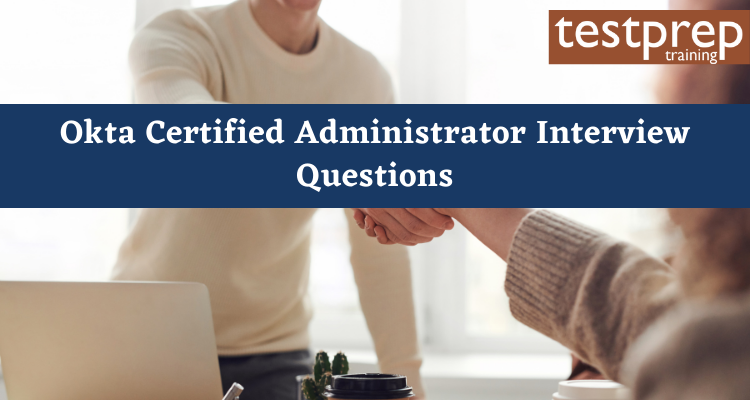Okta Certified Administrator
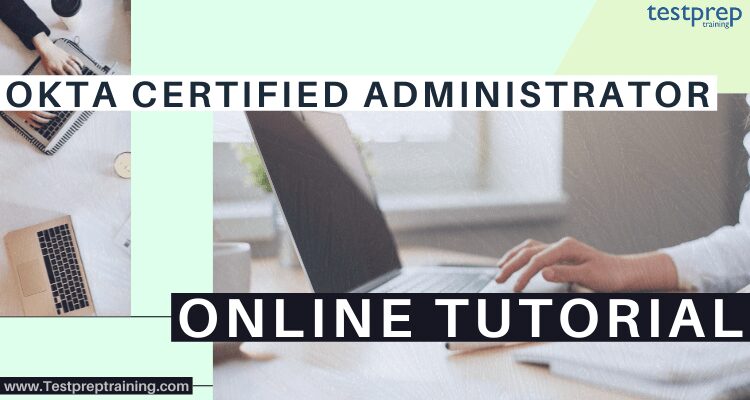
Okta Certified Administrators have proficiency in managing the Okta service with knowledge about how Okta allows advanced User Lifecycle Management scenarios. These scenarios can be involving mobile devices, security policy frameworks, supported SSO options, and advanced directory integration for cloud and on-premise access. Further, administrators use the Okta Policy framework for:
- Firstly, controlling user access
- Secondly, understanding how to map identity attributes and data transformations using Universal Directory, and troubleshoot issues.
Who should take the Okta Administrator Exam?
For Okta Certified Administrator certification, candidates must have taken and passed the Okta Professional Exam. And, they should have the following requirements:
- Firstly, two years of experience in a technical role, working in security and/or identity management
- Secondly, one year of on-the-job experience working with the Okta service
- And, completion of the Okta Essentials course or equivalent training.
Further, candidates for this certification may be Okta Administrators, implementation consultants, identity leaders, system administrators, technical project managers, or technical project owners.
Exam Format
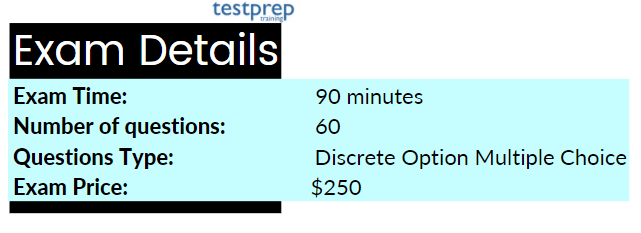
Okta Certified Administrator exam will have 60 discrete option multiple-choice (DOMC) questions. For completing the exam, there is a time duration of 90 minutes. The exam will cost you around $250 (USD).
Schedule the Exam
Okta certification exams are administered and proctored by Examity ( secure online proctoring service). Okta has partnered with Examity for protecting the integrity of our certification exams.
This offers online proctoring in which you can take the exam from almost any location at a time that is convenient for you, without any need for traveling to a test center. However, the Okta Administrator Exam must be scheduled at least 24 hours in advance of the time you plan for sitting for the test in order to avoid the additional fee associated with on-demand testing.
Exam Course Outline
Okta Certified Administrator exam validates candidate’s performance on the basis of the following topics:
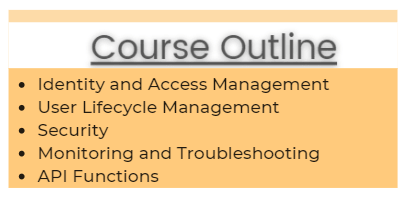
1. Identity and Access Management
1.1 Advanced Directory Integration
- Demonstrate in-depth understanding of the process to manage delegated authentication with AD and LDAP using Okta agents
Reference:
- Configuring an Organization-Wide Password Policy
- Delegated Authentication
- Install and configure the Okta Active Directory agent
- Demonstrate in-depth understanding of the process to manage Okta AD and LDAP agent architecture and best practices
Reference:
- Install and configure the Okta Active Directory agent
- Installing multiple Okta Active Directory agents
- Install the Okta LDAP Agent
- Demonstrating in-depth understanding of the process to manage Okta agent service account and permissions needed for agents and in directories for password reset
Reference:
- Install and configure the Okta Active Directory agent
- Password Synchronization Overview
- Using Sync Password
- Demonstrate in-depth understanding of the process to import and manage users coming from AD, LDAP or stored directly in Okta
Reference:
- Import Active Directory users
- Activate and Deactivate Users
- Manage Groups
- Install and configure the Okta Active Directory agent
- Demonstrating in-depth understanding of how the Okta password sync agent works
Reference:
- Demonstrate knowledge of why Okta/AD password policy should match or exceed the AD policy
Reference:
- Demonstrating knowledge of why multiple Okta/AD password policies might be needed
Reference:
- Configuring an Organization-Wide Password Policy
- Configuring Password Policy Rules
- Creating Group Password Policies
- Demonstrate knowledge of user activation options when using AD as a source
Reference:
- Import Active Directory users
- Install and configure the Okta Active Directory agent
- End user account states
1.2 Single Sign-On (SSO) Federation
- Demonstrating knowledge of how to use the Application Integration Wizard
Reference:
- Demonstrate knowledge of how to configure Okta as a service provider
Reference:
- Demonstrating understanding of the SAML assertion
Reference:
- Demonstrate knowledge of how to set up a template application
Reference:
- Configure the Okta Template App and Okta Plugin Template App
- Configuring the Okta Template WS Federation Application
- Demonstrating in-depth understanding of how to deploy the SWA plug-in and configure related options in Okta
Reference:
- Silently install the Okta Browser plugin using policy settings
- We manage Okta browser plug-in installations. How can I prevent end users from manually installing it?
- Overview of Managing Apps and SSO
- Demonstrate understanding of how Okta supports non-OIN applications
Reference:
- Demonstrating knowledge of the security advantages and caveats in using SAML
Reference:
- Demonstrate knowledge of the configuration of OIN apps, including when to use templates for integrating applications
Reference:
1.3 Desktop SSO deployment
- Demonstrate knowledge of how to deploy on-premises Okta Desktop SSO/IWA, including the requirements for Desktop SSO/IWA
Reference:
- Demonstrate knowledge of user experiences when in zones with Desktop SSO/IWA
Reference:
1.4 Hybrid SaaS strategies and challenges
- Demonstrating knowledge of how Okta can provision users and groups to OIN apps
Reference:
1.5 Architecture
- Demonstrate awareness about the high availability of advanced agents
Reference:
2. User Lifecycle Management
2.1 Profile sourcing and write-back concepts
- Demonstrate knowledge of HR as a source including the benefits of groups and group rules when using an external source
Reference:
- Demonstrate knowledge of when profile sourcing is used
Reference:
- Demonstrating knowledge of when attribute level sourcing is used
Reference:
- Demonstrate knowledge of the value of writing data back to directories and apps from Okta
Reference:
- Demonstrating knowledge of working with multiple profile sources
Reference:
- Demonstrate knowledge of the requirements of Okta lifecycle management and the ability to write to applications
Reference:
- Demonstrating in-depth knowledge of how to configure Okta user profiles, application profiles, and directory profiles
Reference:
- Manage User Profiles
- Active Directory attribute mappings to Okta properties
- An updated AD attribute is not being pushed to an application that has provisioning and “Update User Attributes” enabled
- Demonstrate understanding of the process to create custom attributes in UD
Reference:
- Demonstrating in-depth understanding of the process to create profile mappings
Reference:
2.2 Managing Identities using Universal Directory
- Demonstrate knowledge of the process to use the Okta Expression Language to transform data while mapping data with the Profile Editor
Reference:
- Demonstrating knowledge of the process to use the Okta Expression Language to create a custom username
Reference:
- Demonstrate knowledge of migrating from AD to cloud management of users
Reference:
2.3 Provisioning
- Demonstrate knowledge of the different ways that Okta can perform lifecycle management against apps
Reference:
- Demonstrating knowledge of the typical flow of user registration/onboarding, updates, and de-provisioning
Reference:
- Demonstrate knowledge of how Okta can push groups to various apps
Reference:
2.4 Self-service
- Demonstrate knowledging of the process to manage user’s ability to reset self-service passwords with Active Directory-sourced users or Okta-sourced users
Reference:
- Demonstrate knowledge of application request workflows and entitlement
Reference:
3. Security
3.1 Okta Security Policy and Enforcement Framework
- Demonstrate knowledge of the process to manage application-level MFA and rules
Reference:
- Illustrate knowledging of the process to manage the Okta Sign-on policy including adaptive MFA policy
Reference:
- Demonstrate understanding of the process to configure password policies for Okta-sourced users
Reference:
- Illustrate understanding of the process to configure password policies for Active Directory-sourced users
Reference:
- Demonstrate understanding of how Okta can support legacy MFA solutions
Reference:
- Configuring the On-Prem MFA Agent (including RSA SecurID)
- Okta RADIUS Server Agent Deployment Best Practices
- Configuring RADIUS applications in Okta
- Demonstrate knowledge of the different security postures with MFA factors
Reference:
3.2 Admin Access Control
- Demonstrating knowledge of admin roles
Reference:
4. Monitoring and Troubleshooting
4.1 Logging and Reporting
- Demonstrate understanding of Okta logging
Reference:
- Demonstrate ability to interpret Okta log files
Reference:
- Illustrate knowledge of the logging options available for Okta agents
Reference:
- Demonstrate knowledge of the troubleshooting options for each Okta agent/plug-in
Reference:
- Installing and configuring the Okta Active Directory agent
- Okta LDAP agent log information
- Installing and Configuring the Okta RADIUS Server Agent
5. API Functions
5.1 Token Management
- Demonstrate knowledge of how to create API tokens with the correct permissions
Reference:
5.2 API Extended Functions
- Illustrate knowledge of the importance of API rate limiting
Reference:
- Demonstrate knowledge of the use cases for Okta Management APIs, API-AM, and API products
Reference:
- Create an Authorization Server – Overview
- API Access Management
- Difference Between Okta as An Authorization Server vs Custom Authorization Server
- Demonstrate understanding of the importance of service accounts when using Okta API
Reference:
Check Okta Certified Administrator Exam FAQS
Understanding the DOMC item type
Okta Certified Administrator exam consists entirely of DOMC items. DOMC refers to a powerful measurement tool that produces reliable test scores. It does so by removing several “contaminants” that affect test outcomes but are unrelated to the knowledge and skills being tested. The DOMC item type levels the playing field, and more fairly measures your skills by improving:
- Readability
- However, you are required to read less text, the exam likely to take less time and places little demands on the slower reader or the non-native English speaker.
- Fairness
- When sharp test takers are unsure of an answer, they search for clues by comparing options or obtaining information from other items on an exam. However, DOMC eliminates the test-taking advantage and serves as a strong technique for assessing your knowledge.
- Security
- Rather than displaying all options at the same time, options are randomly presented one at a time. For every option presented, you must make a YES or NO decision for indicating whether you think the option is correct. Answer options are provided in random order, and you are NOT presented with all the available options linked with a DOMC item.
Exam Scoring
DOMC item type is scored fairly and with precision. However,
- Firstly, if you are given with a correct option and respond YES, then that response is scored as “correct”. A DOMC item can be programmed to need one or more correct responses for completing and to be considered answered correctly.
- Secondly, if you are given with a correct option and respond NO, then that item is scored as “incorrect”.
- Thirdly, if you are given with an incorrect option and respond YES, then that item is scored as “incorrect”.
- Lastly, if you are given with an incorrect option, and respond NO , the item is not scored until additional options are presented and responded to.
Exam Retakes
Exam retakes are subject to the following conditions:
- Firstly, a candidate can retake a failed exam 24 hours after his or her first failed attempt
- Secondly, a candidate must wait 14 days after each subsequent failed attempt prior to retaking a failed exam
- Thirdly, candidates cannot not retake passed exams
- Next, the exam fees must be paid for each attempt. And, the fees paid will not be refunded for a failed exam
- Lastly, the exam fees for retaking an Okta certification exam is $100 USD for each retake attempt.
Okta Certified Administrator Exam Study Guide
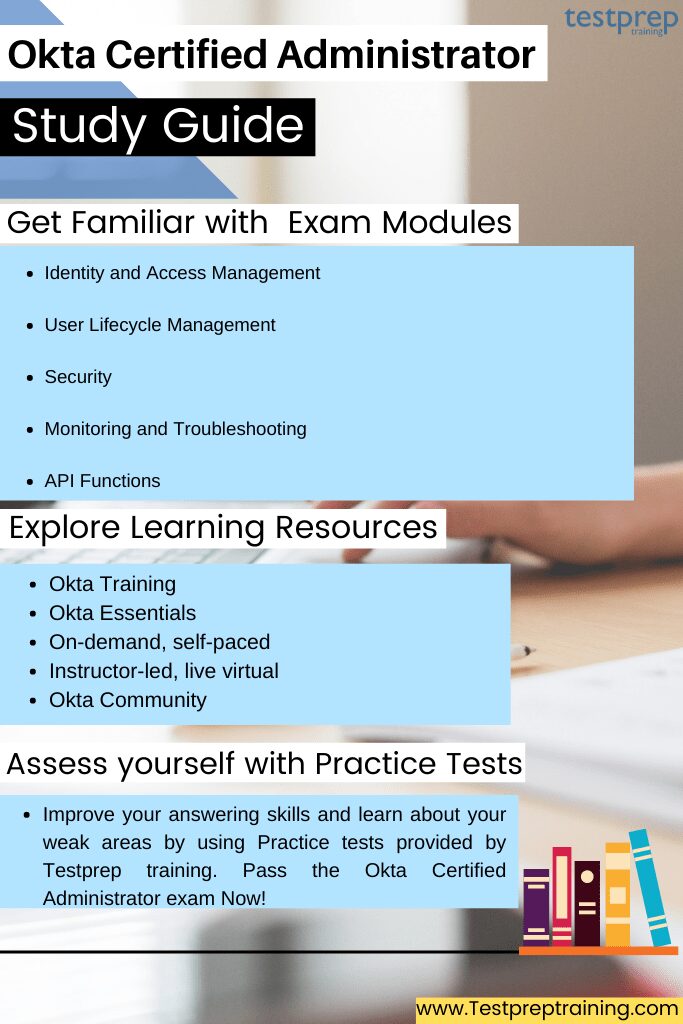
Understanding the Exam Topics
The Okta Certified Administrator exam measures your knowledge and skills in various areas. These areas consist of topics and sections that will help you understand the areas as well as you will be able to apply your practical knowledge and skill in these. However, the topics for the exam are:
- Firstly, Identity and Access Management
- Secondly, User Lifecycle Management
- Thirdly, Security
- Then, Monitoring and Troubleshooting
- Lastly, API Functions
Okta Training
Okta Education Services offers various classes and training materials for helping you in preparing for the certification exam. Some of the training courses for the Okta Administrator exam are:
Advanced Profile Sourcing Methods
This course helps in applying techniques for integrating Okta with multiple sources. Here, you can specify the process of populating Okta profile attributes with the correct “source of truth” supporting the Universal Directory. Moreover, you will deploy provisioning solutions using Lifecycle Management for managing the entire life cycle of your Okta users.
Using Okta as a Service Provider
In this course, you will learn the process for securing connections using Okta Identity Cloud with the standards-based federation to any number of identity providers, negotiating variety over implementations, and managing the trust. Moreover, you will gain knowledge about how external IdP connects to Okta and you will also discover ADFS and the process of connecting an Okta tenant to another tenant using the Org2Org app.
Deploying Office 365 with Okta
In this class, you will learn the process of configuring O365 with Okta in support of four distinct integration scenarios. Here, you will get knowledge about multifactor authentication (MFA) and the process of managing client access policies depending on group memberships. Further, you will examine mobile device management capabilities that enable you to securely administer your O365 user population.
Okta Essentials
Okta essential refers to a foundational course that helps System Administrators and anyone responsible for setting up Okta for accurate implementation. However, the Okta Essentials covers the following topics:
- Okta Overview
- Define Your Users in Okta
- Configure External Directories
- Configure Groups
- Configuring SSO and Provisioning
- Configure Custom App Integrations
- Manage Access Request Workflows
- Configure Universal Directory
- Implement the Okta Policy Framework
- Customize Okta
- Monitor Your Okta Org
- Practical
On-demand Training
Foundations for Flowgrammers Workflows
This is a course will cover key concepts and processes inside the Workflows console. In this, you will learn about integrating technology central to your business and automating tasks like de-provisioning a user and moving their files. Further, this will cover the key concepts and processes inside the Workflows console.
Instructor-led Training
Okta Administrator Certification Exam
Using this course, you will be able to explore the areas like:
- Firstly, key strategies for preparing for the Administrator Exam, including how to use the exam study guide efficiently.
- Secondly, knowing the typical background of a successful candidate for the Okta Administrator Certification.
- Thirdly, participating in Kahoot quiz and benefit firsthand from the instructor discussing the answers to questions on the quiz.
- The, getting tips from the instructor on the topics that most candidates for certification struggle with while preparing for the exam.
- Lastly, exam taking strategies.
Okta Community
During your preparation, you can join the Okta community to connect with people of familiar interests. Here, you can submit new ideas, communicate with Okta, find answers, or join the conversation in the community forums. Moreover, you will hear from customers and partners, as well as Okta’s engineers and product leaders.
Assessing yourself using Practice Tests
Using the practice tests will help you to find out your weak areas and it will improve your answering skills. Further, practice tests also enhance your knowledge level help you get a strong revision by evaluating after every topic. So, start practicing using the Okta Certified Administrator practice exam tests and pass the exam.

